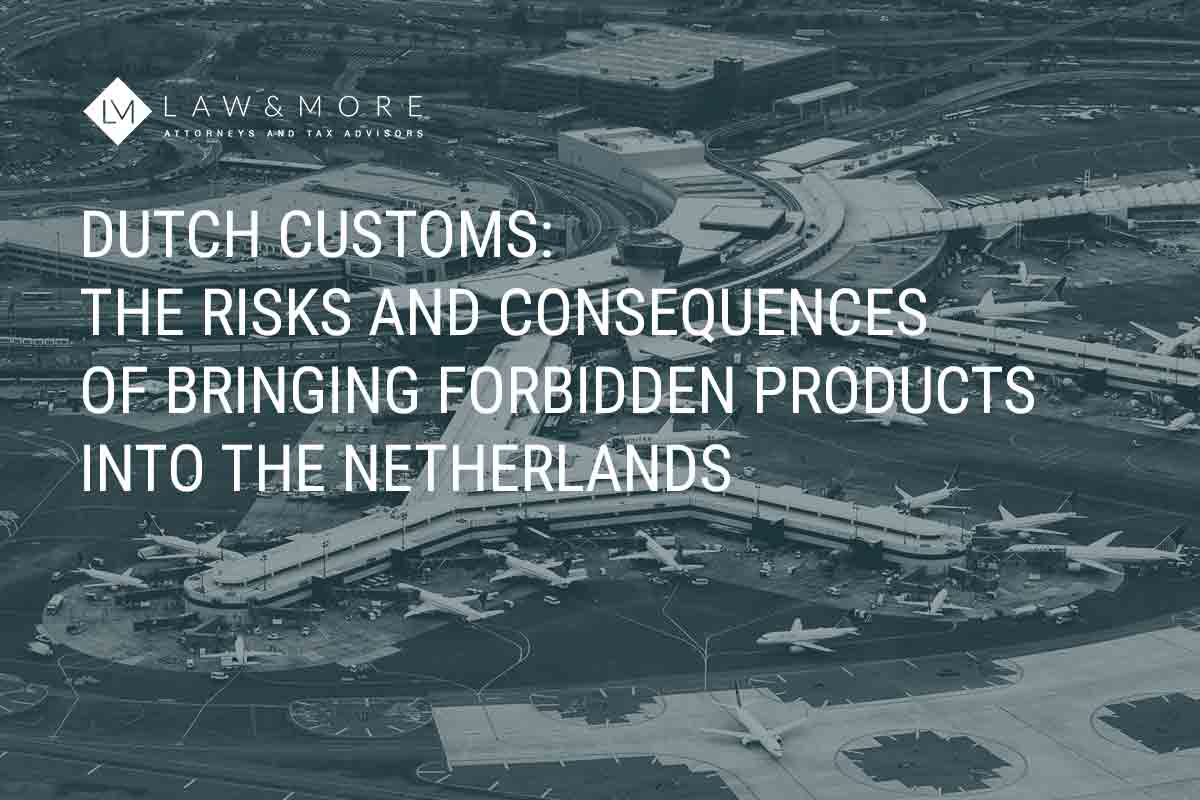Dutch customs: the risks and consequences of bringing forbidden products into the Netherlands
When visiting a foreign country by plane, it is common knowledge that one has to pass customs at the airport. Persons visiting the Netherlands have to pass customs at for instance Schiphol Airport or Eindhoven Airport. It often happens that the bags of passengers contain forbidden products, which then enter the Netherlands on purpose or as a result of ignorance or inattentiveness. Irrespective of the reason, the consequences of these actions can be severe. In the Netherlands, the government has granted customs the special authority to issue criminal or administrative penalties itself. These powers have been laid down in the Algemene Douanewet (General Customs Act). Specifically which sanctions are there and how severe can these sanctions actually get? Read it here!
The ‘Algemene Douanetwet’
Dutch criminal law in general knows the principle of territoriality. The Dutch Criminal Code contains a provision which states that the Code applies to everyone that commits any criminal offence within the Netherlands. This means that the nationality or country of residence of the person committing the offence are no decisive criteria. The Algemene Douanewet is based on the same principle and is applicable to specific customs-situations that occur within the territory of the Netherlands. Where the Algemene Douanewet does not provide specific rules, one can rely upon the general provisions of amongst others the Dutch Criminal Code (‘Wetboek van Strafrecht’) and the General Administrative Law Act (‘Algemene Wet Bestuursrecht’ or ‘Awb’). In the Algemene Douanewet there is an emphasis on criminal sanctions. Furthermore, there is a difference in situations in which the different types of sanctions can be imposed.
Administrative penalty
An administrative penalty can be imposed: when goods are not presented to customs, when one does not comply with license terms, when there is absence of goods at a storage site, when the formalities to complete customs procedures for goods brought into the EU are not met and when the goods have not timely received a customs destination. The administrative fine can reach a height of +- EUR 300,-, or in other cases a height of at most 100% of the amount of duties.
Criminal penalty
It is more likely that a criminal penalty will be imposed in case forbidden goods enter the Netherlands through arrival at an airport. A criminal penalty can for instance be imposed when goods are imported into the Netherlands that according to law may not be imported or that have been wrongly declared. Except for these examples of criminal acts, the Algemene Douanewet describes a range of other criminal acts. The criminal fine can normally reach a maximum height of EUR 8,200 or the height of the amount of duties that is evaded, when this amount is higher. In case of intentional acts, the maximum fine under the Algemene Douanewet can reach a height of EUR 82,000 or the height of the amount of duties that is evaded, when this amount is higher. In some cases, the Algemene Douanewet sets a prison sentence. In that case, the acts or omissions can be seen as a crime. When the Algemene Douanewet does not set a prison sentence but only a fine, the acts or omissions can be seen as an offence. The maximum prison sentence included in the Algemene Douanewet is a sentence of six years. When forbidden goods are imported into the Netherlands, the punishment could be a sentence of four years. The fine will in such a case have a maximum of EUR 20,500.
Procedures
- Administrative procedure: the administrative procedure differs from the criminal procedure. Depending on the severity of the act, the administrative procedure can be simple or more complicated. In case of acts for which a fine of less than EUR 340,- can be imposed, the procedure will usually be simple. When an offense is noticed for which an administrative fine may be imposed, this will be communicated to the person concerned. The notice contains the findings. In case of acts for which the fine can be higher than EUR 340,- a more detailed procedure needs to be followed. First, the person involved must receive a written notice of the intention to impose the administrative fine. This grants him or her the possibility to resist the fine. Afterwards it will be decided (within 13 weeks) whether or not the fine will be imposed. In the Netherlands one can object a decision by an administrative body (the inspector) within six weeks after the decision. The decision will be reconsidered within a period of six weeks. Afterwards, it is also possible to take the decision to court.
- Criminal procedure: When a criminal offense is detected, an official report will be made, on the basis of which a penal order can be issued. When a penal order is issued with an amount higher than EUR 2,000, the suspect must first be heard. A copy of the penal order will be provided to the suspect. An inspector or a designated official will determine the time within which the fine must be paid. After fourteen days after receipt of the copy of the penal order by the suspect, the fine is recoverable. When the suspect does not agree with the penal order, he can resist the penal order at the Dutch public prosecution department within two weeks. This will result in a reassessment of the case, after which the penal order can be cancelled, changed or one can be called to court. The court will then decide what happens. In more severe cases, the official report as mentioned in the first sentence of the previous paragraph must first be sent to the public prosecutor, who then can pick up the case. The public prosecutor can then also decide to refer the case back to the inspector. When the penal order is not paid, a prison sentence can follow.
Height of the penalties
Guidelines for the penalty are included in the Algemene Douanewet. The specific height of the penalties is determined by either an inspector or a designated official or the public prosecutor (the latter only in case of a criminal act), and will be laid down in a penal order (strafbeschikking) or an administrative decision (beschikking). As described earlier, one can raise objections to the administrative decision (‘bezwaar maken’) at the administrative body or one can resist the penal order at the public prosecutor. After this latter resistance, the court will pass a judgment on the matter.
How are these penalties imposed?
The penal order or administrative decision will usually follow a while after the incident, as it takes some procedural/administrative work to put all the relevant information on paper. Nonetheless, it is a known phenomenon under Dutch law (especially Dutch criminal law) that it could, under circumstances, be possible to pay penal orders immediately. A good example is the direct payment of penal orders in case of drug possession at Dutch festivals. This is, however, never recommended, as paying the fines immediately constitutes an admission of guilt, with many possible consequences such as a criminal record. Nevertheless, it is recommended to pay or resist the fine within the given time. When after several reminders the penalty still isn’t paid, one will usually call in the help of a bailiff to retrieve the amount. When this does not prove effective, a prison sentence can follow.
Contact
Should you have any further questions or comments after reading this article, feel free to contact mr. Ruby van Kersbergen, attorney-at-law at Law & More via ruby.van.kersbergen@lawandmore.nl or mr. Tom Meevis, attorney-at-law at Law & More via tom.meevis@lawandmore.nl or call us on +31 (0)40-3690680.

